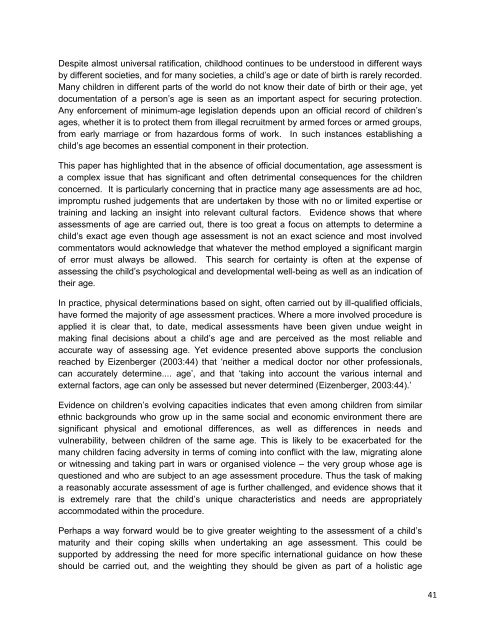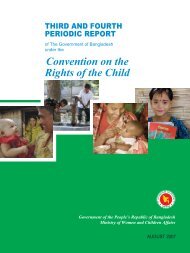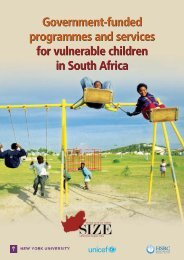Age assessment practices: a literature review & annotated ... - Unicef
Age assessment practices: a literature review & annotated ... - Unicef
Age assessment practices: a literature review & annotated ... - Unicef
You also want an ePaper? Increase the reach of your titles
YUMPU automatically turns print PDFs into web optimized ePapers that Google loves.
Despite almost universal ratification, childhood continues to be understood in different ways<br />
by different societies, and for many societies, a child‟s age or date of birth is rarely recorded.<br />
Many children in different parts of the world do not know their date of birth or their age, yet<br />
documentation of a person‟s age is seen as an important aspect for securing protection.<br />
Any enforcement of minimum-age legislation depends upon an official record of children‟s<br />
ages, whether it is to protect them from illegal recruitment by armed forces or armed groups,<br />
from early marriage or from hazardous forms of work. In such instances establishing a<br />
child‟s age becomes an essential component in their protection.<br />
This paper has highlighted that in the absence of official documentation, age <strong>assessment</strong> is<br />
a complex issue that has significant and often detrimental consequences for the children<br />
concerned. It is particularly concerning that in practice many age <strong>assessment</strong>s are ad hoc,<br />
impromptu rushed judgements that are undertaken by those with no or limited expertise or<br />
training and lacking an insight into relevant cultural factors. Evidence shows that where<br />
<strong>assessment</strong>s of age are carried out, there is too great a focus on attempts to determine a<br />
child‟s exact age even though age <strong>assessment</strong> is not an exact science and most involved<br />
commentators would acknowledge that whatever the method employed a significant margin<br />
of error must always be allowed. This search for certainty is often at the expense of<br />
assessing the child‟s psychological and developmental well-being as well as an indication of<br />
their age.<br />
In practice, physical determinations based on sight, often carried out by ill-qualified officials,<br />
have formed the majority of age <strong>assessment</strong> <strong>practices</strong>. Where a more involved procedure is<br />
applied it is clear that, to date, medical <strong>assessment</strong>s have been given undue weight in<br />
making final decisions about a child‟s age and are perceived as the most reliable and<br />
accurate way of assessing age. Yet evidence presented above supports the conclusion<br />
reached by Eizenberger (2003:44) that „neither a medical doctor nor other professionals,<br />
can accurately determine.... age‟, and that „taking into account the various internal and<br />
external factors, age can only be assessed but never determined (Eizenberger, 2003:44).‟<br />
Evidence on children‟s evolving capacities indicates that even among children from similar<br />
ethnic backgrounds who grow up in the same social and economic environment there are<br />
significant physical and emotional differences, as well as differences in needs and<br />
vulnerability, between children of the same age. This is likely to be exacerbated for the<br />
many children facing adversity in terms of coming into conflict with the law, migrating alone<br />
or witnessing and taking part in wars or organised violence – the very group whose age is<br />
questioned and who are subject to an age <strong>assessment</strong> procedure. Thus the task of making<br />
a reasonably accurate <strong>assessment</strong> of age is further challenged, and evidence shows that it<br />
is extremely rare that the child‟s unique characteristics and needs are appropriately<br />
accommodated within the procedure.<br />
Perhaps a way forward would be to give greater weighting to the <strong>assessment</strong> of a child‟s<br />
maturity and their coping skills when undertaking an age <strong>assessment</strong>. This could be<br />
supported by addressing the need for more specific international guidance on how these<br />
should be carried out, and the weighting they should be given as part of a holistic age<br />
41
















